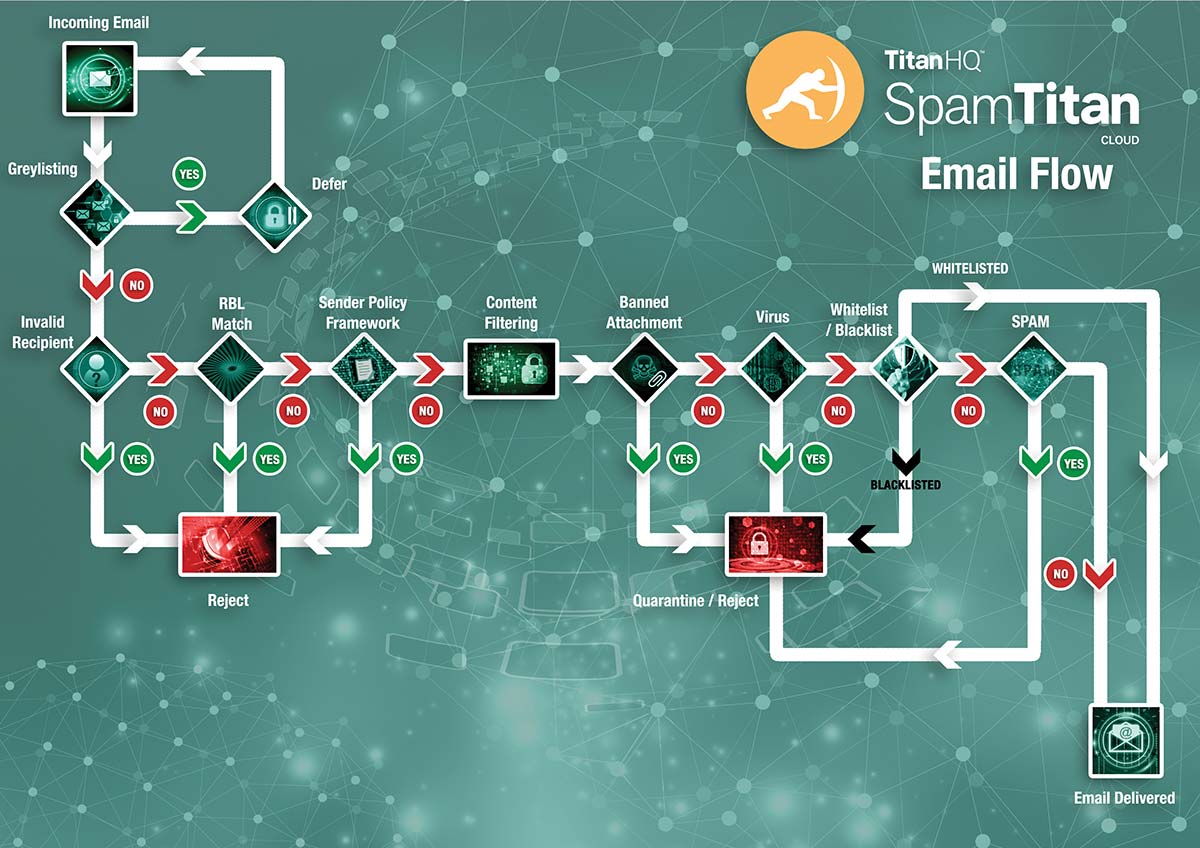It has it benefits over on-premises email filters inasmuch as a hosted email filter has fewer (if any) maintenance overheads, can easily be scaled up or down depending on the changing environment of your business, and is generally cheaper than an on-premises solution.
Most service providers host their email filtering services in high security data centers, have SLAs in place for when outages occur, and provide expert support and monitoring 24/7. For many SMBs, a hosted email filter is the ideal spam filtering solution, as it leverages cloud-based services to provide an enterprise-class solution for businesses on a tighter budget.
Does a Hosted Email Filtering Service Filter Emails Any Better?
That depends on the email filtering service you choose. Not all hosted email filtering services are the same, and some lack key mechanisms that (in our opinion) sacrifice online security for performance. Naturally, the filtering settings applied by a system administrator will also influence how effective a hosted email filter is at protecting a business from email-borne threats as well.
For this reason, the best hosted email filtering services are those which are easy to use. A hosted email filter can have all the “granularity” in the world to apply different settings to different users depending on their roles; but if it is too complicated to apply different settings to different users - and gaps in the filtering parameters allow spam emails to enter the business - the high level of granularity is worthless.
Did You Know?
99.99%
SpamTitan's spam catch rate
11 Seconds
a ransomware attack occurs
$285
the average cost to manage spam per person without an email filter
56.50%
of all email is spam
Going Back to the Online Security vs Performance Issue
When you use a cloud-based email filtering service, the filtering process is conducted in the cloud - eliminating any strain on the business´s CPU or mail server. Therefore, it is difficult to comprehend why some service providers omit to include resource-intensive features such as greylisting and outbound filtering in their services - unless it is to save resources at their end.
Greylisting in particular is a very important online security mechanism. Most email filtering services use SURBL filters to block the delivery of emails from IP addresses from which spam email is known to have originated. What greylisting does is return every email and request it is sent again. Spammers´ servers are usually too busy to respond to the request, so the email never gets resent.
In this way, a hosted email filter with greylisting prevents the delivery of spam emails from not-yet-known sources of spam - giving businesses a higher level of protection against email-borne threats such as phishing, malware and ransomware without any loss of network performance. The greylisting process can create short delays in email receipt, which is why we also include a whitelisting feature in our hosted email filter in order to allow emails from trusted senders to bypass the greylisting security mechanism.
Hear from our customers
More about our Hosted Email Filter
Our hosted email filter is SpamTitan Cloud - a full-service email security solution that protects your business, your email users and your contacts. Being a cloud-based email filtering service, SpamTitan Cloud is easy to set up, requires no software installations, and is managed via a web-based portal with an intuitive user interface for the simple application of user policies and parameter settings.

SpamTitan Cloud has a verifiable spam detection rate of 99.97% due to its multi-layered online security mechanisms (which include SURBL filtering and greylisting). SpamTitan Cloud also uses Real Time Blacklists (RBLs), sender policy frameworks, recipient verification and Bayesian analysis to offer the best level of protection against spam email and the potential threats it contains.
As the filtering service user, you decide on what spam thresholds are acceptable to you and how you want spam email treated (deleted, quarantined, etc.). Reports can be scheduled daily to advise you of deleted and quarantined emails so you cam amend the thresholds as necessary. Finally, all inbound and outbound mail is scanned by dual anti-virus engines to ensure not only your network is protected from email-borne malware, but the networks of your clients and business contacts as well.
Try SpamTitan Cloud Free for Fourteen Days
If you are concerned about the volume of spam email evading detection in your business, you are invited to try SpamTitan Cloud free for fourteen days. Our free trial gives you the opportunity to experience the power of SpamTitan Cloud in your own environment (or our anti spam software based gateway solution), witness how easy it is to use, and monitor its effectiveness at preventing spam email entering your network.
Our team will be happy to answer any questions you have about our hosted email filter and guide your through the registration process to start your free trial of SpamTitan Cloud. The process only takes minutes to complete, so contact us today to find out more.
Articles about Cloud-based Anti-Spam Services
What is a Cloud Based Hosted Spam Filter?
Choose the best Hosted Spam Filter
What is a spam filter gateway?
Cloud Based Email Filtering Service
Frequently Asked Questions (FAQs)
What advantages does a hosted email filter have over an on-premises solution?
The advantages a hosted email filter has over an on-premises solution include the lack of maintenance overheads, scalability, and cost-effectiveness. However, when choosing between a hosted email filter and an on-premises solution, it is important not to overlook the ease of use and configuration capabilities of either solution.
Where do most service providers host their remote email filtering services?
Most service providers host their remote email filtering services in the cloud. This is because the cloud offers more security, scalability, and redundancy than a private data center and has the mechanisms to support user authentication, fluctuating volumes of users, and high-percentage Service Level Agreements.
Why is a hosted email filter considered suitable for SMBs?
A hosted email filter is considered suitable for SMBs because the filter leverages cloud-based services to provide an enterprise-class solution at a more affordable price. The scalability, ease of use, and reduced maintenance costs make it particularly appealing for businesses operating on a tighter budget, while offering quality protection against email threats.
Do all hosted email filtering services have the same capabilities?
Not all hosted email filtering services have the same capabilities and it is important for businesses to compare solutions in order to avoid those that sacrifice security for speed or those that are packed with capabilities a business will pay for but never use. Thereafter, factors such as ease of use and configuration should take priority over price.
Why is Greylisting an important feature for email security?
Greylisting is an important feature for email security because most email filtering mechanisms work retrospectively (i.e., block lists and ML capabilities are based on previous spam history). Greylisting helps reduce spam from previously unknown sources - and previously unknown patterns of spam - by returning all emails from non-whitelisted sources to their originating servers.
Returned emails are accompanied with a request for the emails to be resubmitted; but, due the volume of emails returned to spammers’ servers (via all filtering processes), the “retry” function is usually disabled to preserve bandwidth for fresh spam. Consequently, greylisted spam emails are rarely returned to the intended destination mail server.
What is the purpose of the whitelisting feature in an email filter?
The purpose of the whitelisting feature in an email filter is to allow emails from trusted sources to bypass some of the filter’s mechanisms, which accelerates the delivery of the emails. While a useful feature to prevent delays, whitelisting should not be used too widely in case the originating email account is compromised and used to send email-borne threats.


